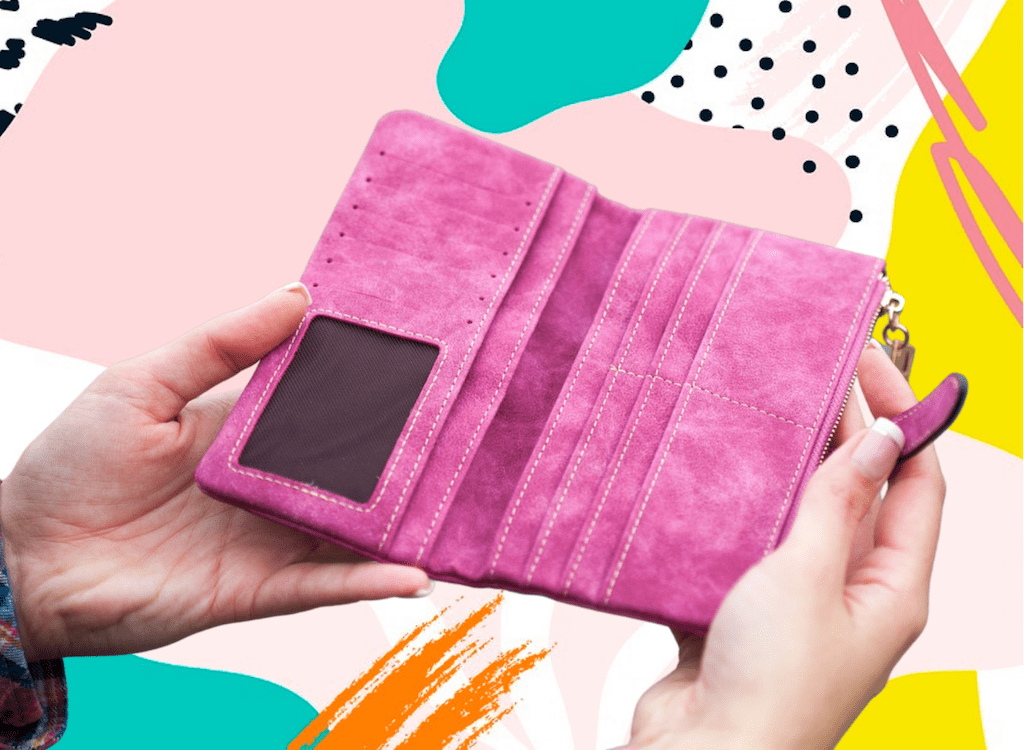Everyone has a vocal checklist when they leave their house, don’t they? All together now; ‘’Wallet, phone, keys.’’ A familiar refrain, for sure.
Leave without your keys, and you’re shimmying up a drainpipe to get back into your gaff. Head out sans phone, and you might actually have to make eye contact with someone in public. And you don’t want that.
But today, we’re focusing on the first item. Because get caught short without your wallet, and you’re in all kinds of hot water.
What you carry in your wallet can get you into – or get you out of – trouble, make no mistake. In the right hands (as in, your own) your wallet is your best friend when you hit the town, the high street or the shopping centre. In the wrong ones….well, it just doesn’t bear thinking about.
But think about it we shall; here’s what you should and shouldn’t keep in your wallet or purse.
FIRST, THE WALLET
They say it’s good luck to buy a wallet with your first paycheck. Should you have just received yours, or you’re buying one without superstition in mind, what should you be looking for?
Firstly, let’s talk about functions; you want a wallet that has space for cash, a small pocket for a few coins, and several spaces for cards, at a minimum.
When talking about style, the classic leather (or pleather, preferably) wallet is the way to go. Anything textile or containing velcro risks making you look a little juvenile – that paycheck we mentioned, did it come from your paper round? You get the picture.
Generally speaking, as the guys at Bullsheath leather wallets for men tell us, classic wallets are segmented into either bifold, trifold or ‘minimalist’, which is essentially a sleeve for holding cards, sometimes with a small clip attached for notes. These are generally preferred for those donning slick suits who don’t want that bulge of a bi or tri fold, but don’t offer much leeway, space wise. For everyday use, bifold is perhaps best.
Colour wise, we’d recommend sticking with black or dark brown. There’s plenty of opportunity to spice up your outfit with pops of colour, but perhaps your wallet isn’t one of them.

WHAT YOU SHOULD KEEP IN YOUR WALLET
So now that we know what your wallet should look like, let’s talk about what you should – and shouldn’t – be keeping in it.
- Cash – You always want to have some cash on you. If it’s just a regular day, then enough for at least for a meal and a taxi fare is a good ballpark figure. If you’re going out, bring some extra, just in case.
- Bank cards – Your debit card should be with you at all times, and preferably two different types (like a Visa and a Mastercard) so you have payment options for different stores. If you’re an impulsive spender, you might want to leave the majority of your credit cards at home unless you’re going for a targeted purchase.
- Loyalty cards – Because you wouldn’t want to miss out on that free ninth cortado, right? Any sort of loyalty card you have to present at a shop to get a discount, you might want to have with you. Should you be keen to streamline your wallet’s density, then enquire about substituting any loyalty card you carry with an app version for your phone.
- ID – Depending on where you live, it’s most likely legally required to have an ID card with you at all times when you’re out. A simple government-issued ID with a picture and your address should be enough, although often, your driving licence will suffice, which, incidentally, you should carry in your wallet, too. You don’t want to bring along your passport unless you’re travelling, though.
- Emergency contact information – Imagine this scenario; something happens where you get hurt or you’re unconscious, and you end up in the hospital (sorry you had to imagine that). Who would you want the hospital to call? Their names and numbers should be written in your emergency contact list and put in a visible place in your wallet. No need to write your name down, since you’ll have your ID in there.
- Business cards – If you often give out business cards, you should have a separate small case or microwallet where you keep only your business cards, and any cards you might be given. But if it’s a rare occasion that such an exchange occurs, you can keep one or two cards in your wallet, just in case, or make a digital business card that people can scan right off your phone to theirs.
- Receipts – Get in the habit of taking all of your receipts out of your wallet as soon as you get home and putting them in a dedicated spot where you can access them for reference, a return or an exchange, or to complete your tax return. Don’t let receipts build up in your wallet, as they’ll be the first things to get discarded in a clearout.

AND, WHAT YOU SHOULDN’T…
- Several credit cards – Carry one, at most. A would be thief can quickly drain your bank accounts should they happen across a wallet containing several credit cards.
- Cheques – Yep, some people do still use cheques…..but you do not want to keep blank cheques in your wallet in case it ever gets lost or stolen. Doing so makes it incredibly easy for someone to fill them out and steal your money that way.
- Foreign currency – If you’re on holiday, then this is another matter, but if you just got back from a trip and you still have some foreign bills knocking around, it’s just clutter, frankly. Sure, you might want to show off those ‘just been on my hols’ stripes, but that’s what Instagram is for.
- Insurance cards – Medical insurance, car insurance, home insurance… not only might these cards reveal personal information about you which could lead to you having your identity stolen (ie. your social security of National Insurance number), but all of this information should be available online, anyway.
- Spare key – You should not, at any cost, keep a spare key to your house in your wallet. If it was ever to get stolen, someone now has your name (via your bank cards) and your house key, and you’re a prime target for theft. Instead, invest in a key safe only accessible by pincode, and install it somewhere discreet near your property.
- Condoms – Hey, credit to you for taking precautions, but you shouldn’t really carry condoms in your wallet. Yes, it’s a good idea to always have some with you, but the wallet is no place for them since they can get hot or damaged here, and as a consequence, lose their integrity over time.
- List of passwords – Hey, we all know someone who does it, right? Everyone knows how hard it can be to remember a list of random passcodes and passwords, but if you keep a list of all of your pin codes in your wallet right next to your credit cards, you’re giving someone the thumbs up for someone to go crazy with your cards. If you’re having trouble remembering them, save the pin codes as contacts under weird names on your phone.
THE BOTTOM LINE
Having a tidy and organised wallet will not only make your life easier, but it will give the impression of a grown-up, put-together adult who knows what they are doing. Fake it ‘till you make it, hey?
Did you know that your wallet is one of the most bacteria-laden everyday items going? Check out our guide to the 7 everyday items you might not be sanitising enough to learn more!





